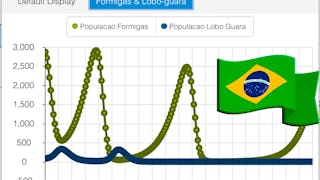- Browse
- Environmental Economics
Environmental Economics Courses Online
Explore environmental economics for analyzing economic policies and their environmental effects. Learn about cost-benefit analysis and sustainable development.
Explore the Environmental Economics Course Catalog
 Status: Free TrialFree TrialU
Status: Free TrialFree TrialUUniversity of Maryland, College Park
Skills you'll gain: Construction Management, Project Controls, Construction, Project Schedules, Cost Estimation, Change Control, Contract Management, Project Management, Timelines, Scheduling, Project Documentation, Project Planning, Safety Assurance, Cost Control, Arbitration
4.9·Rating, 4.9 out of 5 stars8 reviewsIntermediate · Course · 1 - 3 Months
 Status: Free TrialFree TrialU
Status: Free TrialFree TrialUUniversidad Nacional Autónoma de México
Skills you'll gain: Process Engineering, Energy and Utilities, Engineering Design Process, Design Specifications, Engineering Calculations, Cost Estimation, Mathematical Modeling, Simulation and Simulation Software, Safety Standards
4.9·Rating, 4.9 out of 5 stars10 reviewsAdvanced · Course · 1 - 3 Months
 Status: Free TrialFree TrialU
Status: Free TrialFree TrialUUniversity of Colorado Boulder
Skills you'll gain: Sustainable Business, Corporate Sustainability, Stakeholder Engagement, Sustainability Reporting, Environmental Social And Corporate Governance (ESG), Supply Management, Sustainability Standards, Procurement, Business Operations, Strategic Communication, Communication Strategies, Water Sustainability, Employee Engagement, Operational Efficiency, Supply Chain Management, Resource Utilization, Innovation, Waste Minimization, Systems Thinking, Culture
4.4·Rating, 4.4 out of 5 stars8 reviewsBeginner · Course · 1 - 4 Weeks

Skills you'll gain: Simulation and Simulation Software, Simulations, Mathematical Modeling, Agentic systems, Environment, Biology
4.7·Rating, 4.7 out of 5 stars12 reviewsBeginner · Guided Project · Less Than 2 Hours
 Status: Free TrialFree Trial
Status: Free TrialFree TrialSkills you'll gain: Construction, Hydraulics, Construction Engineering, Equipment Design, Maintenance, Repair, and Facility Services, Grading (Landscape), Civil Engineering, Construction Management, Safety Standards, Plant Operations and Management, Vibrations, Facility Repair And Maintenance, Production Process
5·Rating, 5 out of 5 stars6 reviewsIntermediate · Course · 1 - 4 Weeks
 Status: Free TrialFree TrialB
Status: Free TrialFree TrialBBanco Interamericano de Desarrollo
Skills you'll gain: Risk Analysis, Risk Management, Risk Modeling, Hazard Analysis, Mitigation, Project Risk Management, Failure Analysis, Risk Mitigation, Disaster Recovery, Failure Mode And Effects Analysis, Climate Change Adaptation, Vulnerability Assessments, Public Policies, Quantitative Research, Qualitative Research
4.4·Rating, 4.4 out of 5 stars14 reviewsAdvanced · Course · 1 - 4 Weeks
 Status: Free TrialFree TrialL
Status: Free TrialFree TrialLL&T EduTech
Skills you'll gain: Mechanics, Hydraulics, Construction, Structural Engineering, Structural Analysis, Mechanical Engineering, Construction Engineering, Equipment Design, Construction Inspection, Engineering Practices, Engineering, Engineering Analysis, Safety Standards, Engineering Calculations
Intermediate · Course · 1 - 3 Months
 Status: Free TrialFree Trial
Status: Free TrialFree TrialSkills you'll gain: Responsible AI, Anomaly Detection, Computer Vision, Microsoft Azure, Data Ethics, Artificial Intelligence, Natural Language Processing, Artificial Intelligence and Machine Learning (AI/ML), Machine Learning
4.3·Rating, 4.3 out of 5 stars13 reviewsBeginner · Course · 1 - 4 Weeks
 Status: PreviewPreviewP
Status: PreviewPreviewPPolitecnico di Milano
Skills you'll gain: Sustainable Business, Business Modeling, Corporate Sustainability, Environmental Social And Corporate Governance (ESG), Business Transformation, Business Technologies, Resource Management, Finance, Policy Development, Case Studies
4.7·Rating, 4.7 out of 5 stars7 reviewsBeginner · Course · 1 - 3 Months
 Status: NewNewStatus: Free TrialFree Trial
Status: NewNewStatus: Free TrialFree TrialSkills you'll gain: Transportation Operations, Business Planning, Market Analysis, Process Design, Supplier Management, Cost Management
Mixed · Course · 1 - 4 Weeks
 C
CCoursera
Skills you'll gain: AWS CloudFormation, Amazon Web Services, Amazon Elastic Compute Cloud, Event-Driven Programming, Serverless Computing, Event Monitoring, Software Engineering
4.8·Rating, 4.8 out of 5 stars8 reviewsBeginner · Guided Project · Less Than 2 Hours
 Status: NewNewStatus: Free TrialFree Trial
Status: NewNewStatus: Free TrialFree TrialSkills you'll gain: Credit Risk, Loans, Environmental Social And Corporate Governance (ESG), Risk Management, Derivatives, Financial Analysis, Risk Analysis, Portfolio Management, Financial Modeling, Financial Regulations, Compliance Management, Market Dynamics, Business Valuation, Economics, Business Modeling, Structural Analysis, Excel Formulas
Intermediate · Course · 1 - 3 Months
Environmental Economics learners also search
In summary, here are 10 of our most popular environmental economics courses
- Construction Management Field Operations and Admin Tools: University of Maryland, College Park
- In core nuclear fuel management: Universidad Nacional Autónoma de México
- Sustainable Business Practices: University of Colorado Boulder
- Modelo de Ecossistema com Insight Maker: Coursera
- Construction Machinery for Concreting /Roads & Earth Moving: L&T EduTech
- Análisis cualitativo y cuantitativo del riesgo de desastres : Banco Interamericano de Desarrollo
- Concepts of Heavy Lifting: L&T EduTech
- Intro to Artificial Intelligence on Microsoft Azure: Microsoft
- Circular business models fostering sustainability: Politecnico di Milano
- Analyze Global Logistics: A Strategic Supply Chain Case: EDUCBA










